Friday, January 27, 2006
The Miracle Strain (review - book)
The Issue of Faith and Folly
"Now faith is the assurance (or the substance) of things hoped for, the conviction (or the evidence) of things not seen."Basically faith is a belief in something you cannot see. Faith is a concept which is heavily romanticized in religious culture. All religions profess faith, and without it a religion cannot stand under scrutiny. Scientists have faith too - they call them theories. I have faith that gravity exists although gravity is an invisible force because I accept the Theory of Gravity. But like theories, all faith must be based on some premise or observation. Otherwise it is a blind faith. If I state 2 + 2 = 4 and you merely memorize it and believe it, your faith is blind. If you take the effort to check out the concept by putting 2 apples and 2 apples together, your faith is justified, you have reason to believe that 2 +2 always makes 4. Everything is bound by logic. You cannot accept two contrasting beliefs. If the Catholic says speaking in tongues is heresy but the Pentecostal says speaking in tongues is a spiritual gift, one of them is wrong. They cannot both profess faith to justify their belief against one another. A belief in something which has an incorrect premise is not faith, but folly.
Wednesday, January 25, 2006
The Birthdays

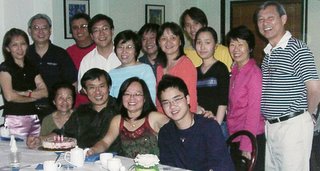
Wednesday, January 18, 2006
The 153th Article
Thursday, January 12, 2006
The Biggest Cabinet
“I have no inspiration yet”Well there you have it - he's still waiting for inspiration. I remember someone commenting on a blog about the saying that went "99% perspiration, 1% inspiration"... It's been two years without anything concrete from our PM in reforming the government. Lim Kit Siang observes that Malaysia has actually fallen from 37th to 39th place in Transparency International's Corruption Perception Index. We have seen a year of AP drama, numerous police vs human rights scandals, persecution of the press, dubious elections. But perhaps the absence of action is more worrying. When Abdullah Badawi first took power there were a few high-profile corruption cases that got all our hopes up that something was finally going to get done. Funnily enough I can't recall anything this year - was no one corrupt in 2005? Trying to get information from the Anti-Corruption Agency's website was humorous, the page has not been updated since 2003. Remember the much-lauded Royal Police Commission Report and its 125 recommendations, followed by a rebranding of the police complete with new motto and everything? And yet we still have Squatgate and many many other reports of police abuse. Naturally the PM's solution to Squatgate was to recommend yet another commission. One begins to detect a pattern here. And it has been pointed out that before his ascension to PM, Abdullah Badawi was Home Affairs Minister and hence in charge of the police. Malaysians are becoming increasingly cynical and disillusioned with the Government. Everyday we are drowned with rhetoric from the ministers and rosy pictures from the media, but somehow nothing seems to change.
Wednesday, January 11, 2006
The Ydorap

Thursday, January 05, 2006
The Time-Traveller
Greetings. I am a time traveler from the year 2036. I am on my way home after getting an IBM 5100 computer system from the year 1975. My "time" machine is a stationary mass, temporal displacement unit manufactured by General Electric. The unit is powered by two, top-spin, dual-positive singularities that produce a standard, off-set Tipler sinusoid.
Sounds like the start of a science fiction novel or movie, doesn't it? It's not. The above is a post made on an Internet message board by "John Titor" on January 27, 2001. Over the next few months he talked online with skeptics and believers before stating that he was returning to his own time on March 24, 2001. He was never heard from again.
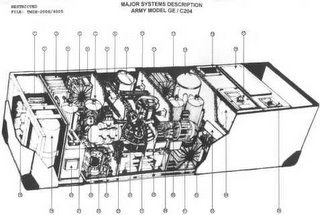 People claiming to be time-travellers are not unheard of, especially with the anonymity of the Internet. What made John stand out was his ability to describe the theories and physics behind time-travel that fit into existing concepts of spacetime, and black holes. He even posted pictures of his device, and technical manuals accompanying it.
He stated that time paradoxes like the grandfather paradox did not exist, but that the Everett-Wheeler model (Many-Worlds Interpretation) - of a multiverse in which all possible actions are carried out - is correct.
People claiming to be time-travellers are not unheard of, especially with the anonymity of the Internet. What made John stand out was his ability to describe the theories and physics behind time-travel that fit into existing concepts of spacetime, and black holes. He even posted pictures of his device, and technical manuals accompanying it.
He stated that time paradoxes like the grandfather paradox did not exist, but that the Everett-Wheeler model (Many-Worlds Interpretation) - of a multiverse in which all possible actions are carried out - is correct.
Most people were of course very skeptical about Titor's claims. He in turn would often state he was not concerned whether people would believe him, and rather assumed people wouldn't - "What would it take for you to believe in a time traveller?" Skepticism, he said, was what made discussions interesting, rather than people accepting every word he said. He stated his purpose was to gauge the reaction of people to him. Some critics observed he would often parry the most direct questions posed to him, and reflect them on the questioner. But to his credit he did answer many questions about time and time travel, and the future.
Titor made a number of predictions about the future. Some, set in the near future, appeared on surface to bolster his claims as they came to pass. He mentioned that CJD (mad cow disease) would become more widespread but be played down, that Iraq would be accused of possessing nukes, and that the US government would begin to sacrifice civil rights for security (bear in mind his posts predated 9/11). He also knew obscure details, like certain UNIX systems having a year 2038 bug, and the IBM 5100 having hidden functions. He even hinted that the anticipated y2k bug problems did not come to pass because of future invervention.
He often described the philosophies and cultures of his time:
The war had very profound affects on people and how they relate to each other. As individuals, almost everyone in 2036 is very familiar with death. We all have stories of loved ones that have died from disease, war or acts of inhumanity. Most of us have even taken part in dishing the same thing out to the other side. As a result, we have become far more compassionate to the ones we love but mush less forgiving to those who don’t pull their weight. We are more accepting of other’s differences in our community because we depend on them to survive. We are also more conservative with our resources and closer to God because for a period, life on Earth was Hell.
The other major difference is in the concept of good and evil. With multiple worlds come multiple decisions and outcomes. For every good act, there is an equal and possible bad act on another worldline. Taken to the extreme, this must mean that in God’s eyes, there is no total good and total bad in the superverse. It balances itself out to infinity. I believe we are judged on the decisions we make as individuals and the good/evil I see on my worldline is an illusion that has no worth to God. My reaction to it is what’s important to God. Although this may seem rather heartless, it does allow me to see past the evil that people do and acknowledge the core of potential goodness inside them.
He also made apocalyptic statements about the future: Civil war in the US starting 2004-2005, and a third World War in 2015 which would see the US barraged by nukes. At the same time he stated that because worldines diverged (he estimated a divergence of 2% between our world and his), nothing was set in stone and we still could avoid the bleak future he knew. Skeptics observed that this made most of his claims impossible to verify, others said he was bringing a message of hope.
Was John Titor a hoax? Probably. His depiction of the future suspiciously mirrored popular science fiction themes, 2005 has passed with no signs of an American civil war, and his explanations of how his time machine worked was mercilessly shot down by science experts. But his story still entertains, and sparks thought about the direction that the human race is taking, sort of like what War of the Worlds did on radio in 1938. Time-traveller or storyteller, the tale of John Titor remains a memorable Internet legend.
Sunday, January 01, 2006
The Year 2005 - Looking Back
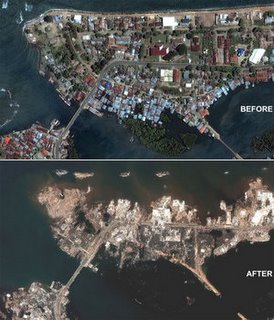 The world still reels from the Asian tsunami of December 2004. Malaysian deaths number about 70; Thailand, 5,000; Sri Lanka, 30,000; Indonesia reported that it stopped counting bodies. Losses are incalculable, but countries all around the world unite to provide aid.
1st - Freedom of Information Act comes into effect in Britain. It makes public bodies accountable to citizens. "The public will gain a legally enforceable right to know if a public body holds information - and the right to ask for it... replies must be made in 20 working days or less."
12th - US intelligence officially gives up the search for WMD in Iraq.
20th - George W. Bush sworn in for his second term as US President.
30th - Iraq holds first free election for the first time in 50 years.
February
13th Shi'ite United Iraqi Alliance wins the first Iraqi elections, capturing half of the vote. Voter turnout was 58%.
16th - The Kyoto Protocol, an environmental resolution aimed at reducing air pollution, takes effect. Notable detractors are the US and Australia.
16th - China replacing US as world's biggest consumer entity.
27th - Million Dollar Baby, the story of an aspiring female boxer, wins Academy Award for Best Picture.
March
The world still reels from the Asian tsunami of December 2004. Malaysian deaths number about 70; Thailand, 5,000; Sri Lanka, 30,000; Indonesia reported that it stopped counting bodies. Losses are incalculable, but countries all around the world unite to provide aid.
1st - Freedom of Information Act comes into effect in Britain. It makes public bodies accountable to citizens. "The public will gain a legally enforceable right to know if a public body holds information - and the right to ask for it... replies must be made in 20 working days or less."
12th - US intelligence officially gives up the search for WMD in Iraq.
20th - George W. Bush sworn in for his second term as US President.
30th - Iraq holds first free election for the first time in 50 years.
February
13th Shi'ite United Iraqi Alliance wins the first Iraqi elections, capturing half of the vote. Voter turnout was 58%.
16th - The Kyoto Protocol, an environmental resolution aimed at reducing air pollution, takes effect. Notable detractors are the US and Australia.
16th - China replacing US as world's biggest consumer entity.
27th - Million Dollar Baby, the story of an aspiring female boxer, wins Academy Award for Best Picture.
March
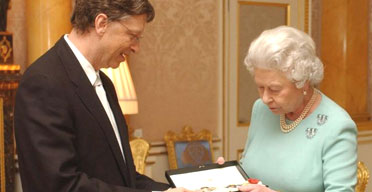 1st - Malaysia launches effort to deport illegal immigrants following the expiration of its amnesty policy.
2nd - Bill Gates receives honourary knighthood for his business skills and work fighting poverty.
8th - The United Nations passes declaration prohibiting human cloning, with a vote of 84-34 and 37 absentees, ".. as they are incompatible with human dignity and the protection of human life"
24th - Soft tissue apparently extracted from remains of a Tyrannosaurus Rex.
31st - Terry Schiavo, the brain-damaged woman at the center of euthanasia controversy, dies.
31st - Prime Minister Abdullah Badawi speaks on Islam Hadhari at Victoria University, New Zealand.
April
1st - Malaysia launches effort to deport illegal immigrants following the expiration of its amnesty policy.
2nd - Bill Gates receives honourary knighthood for his business skills and work fighting poverty.
8th - The United Nations passes declaration prohibiting human cloning, with a vote of 84-34 and 37 absentees, ".. as they are incompatible with human dignity and the protection of human life"
24th - Soft tissue apparently extracted from remains of a Tyrannosaurus Rex.
31st - Terry Schiavo, the brain-damaged woman at the center of euthanasia controversy, dies.
31st - Prime Minister Abdullah Badawi speaks on Islam Hadhari at Victoria University, New Zealand.
April
 2nd - Pope John Paul II passes away at the age of 84. The first non-Italian pope since the 16th century, he covered more of the world than any of his predecessors and is credited as a riving force behind the failure of Soviet communism.
8th - Jeremy Jaynes sentenced to 9 years of prison for illegal email spamming.
9th - Prince Charles marries Camilla Parker Bowles at Windsor.
19th - Jospeh Ratzinger becomes Benedict XVI, the 265th Pope.
May
4th - Petrol and diesel prices in Malaysia increase for the third time in a year as part of a move to wean consumers off Government subsidies.
8th - Disneyland marks 50th anniversary in Disneyland, Anaheim.
16th - Release of the Report of the Royal Commission to Enhance the Operation and Management of the Royal Malaysia Police. 125 recommendations are made to improve the police force.
17th - Star Wars Episode III: Revenge of the Sith debuts at the Cannes Festival, ending the Star Wars sexlogy.
June
14th - Michael Jackson acquitted of child molestation charges
23rd - Nobel Prize winner Jack Kilby, inventor of the integrated circuit (and the handheld calculator), dies at 81. His work pioneered microchips and personal computers.
24th - UMNO vice-president and Minister for Federal Territory Mohd. Isa Abdul Samad is suspended from UMNO after being found guilty of money politics.
July
7th - London wins right to host 2012 Olympics.
7th - London hit by series of terrorist bomb attacks, leaving about 40 dead and 700 injured.
7th - International Trade and Industry Minister Rafidah Aziz told to answer Tun Mahathir's queries over the Approved Permits (AP) issue.
2nd - Pope John Paul II passes away at the age of 84. The first non-Italian pope since the 16th century, he covered more of the world than any of his predecessors and is credited as a riving force behind the failure of Soviet communism.
8th - Jeremy Jaynes sentenced to 9 years of prison for illegal email spamming.
9th - Prince Charles marries Camilla Parker Bowles at Windsor.
19th - Jospeh Ratzinger becomes Benedict XVI, the 265th Pope.
May
4th - Petrol and diesel prices in Malaysia increase for the third time in a year as part of a move to wean consumers off Government subsidies.
8th - Disneyland marks 50th anniversary in Disneyland, Anaheim.
16th - Release of the Report of the Royal Commission to Enhance the Operation and Management of the Royal Malaysia Police. 125 recommendations are made to improve the police force.
17th - Star Wars Episode III: Revenge of the Sith debuts at the Cannes Festival, ending the Star Wars sexlogy.
June
14th - Michael Jackson acquitted of child molestation charges
23rd - Nobel Prize winner Jack Kilby, inventor of the integrated circuit (and the handheld calculator), dies at 81. His work pioneered microchips and personal computers.
24th - UMNO vice-president and Minister for Federal Territory Mohd. Isa Abdul Samad is suspended from UMNO after being found guilty of money politics.
July
7th - London wins right to host 2012 Olympics.
7th - London hit by series of terrorist bomb attacks, leaving about 40 dead and 700 injured.
7th - International Trade and Industry Minister Rafidah Aziz told to answer Tun Mahathir's queries over the Approved Permits (AP) issue.
 8th - The G8 summit is held in Gleneagles. The countries involved pledges an increase of 48 billion USD in international aid, and cancellelation of the debt of 18 nations to the IMF and the World Bank. However the summit is criticized for not paying enough attention to trade and environment needs.
9th - Hidden sex scene in controversial video game Grand Theft Auto: San Andreas sparks outrage.
16th - The sixth Harry Potter book, Harry Potter and the Half-Blood Prince, is launched worldwide.
17th - Former Iraq President Saddam Hussein formally charged with genocide.
August
4th - South Korean scientists successfully clone a dog. Snuppy, an Afghan hound, was cloned from DNA extracted from the ear of his "parent".
11th - State of emergency declared in Port Klang and Kuala Selangor after haze-induced air pollution exceeded 500 on the Air Pollution Index.
23rd - 31st - Category 5 storm Hurricane Katrina ravages America, the most destructive natural disaster there in recent history. The city of New Orleans is completely devastated. Economic losses are estimated at 100-200 billion USD, deaths at more than 1,000. Its social impact is large, with thousands of families displaced and many reports of anarchy in its aftermath. The US Government is widely criticized for being slow to respond to the crisis.
8th - The G8 summit is held in Gleneagles. The countries involved pledges an increase of 48 billion USD in international aid, and cancellelation of the debt of 18 nations to the IMF and the World Bank. However the summit is criticized for not paying enough attention to trade and environment needs.
9th - Hidden sex scene in controversial video game Grand Theft Auto: San Andreas sparks outrage.
16th - The sixth Harry Potter book, Harry Potter and the Half-Blood Prince, is launched worldwide.
17th - Former Iraq President Saddam Hussein formally charged with genocide.
August
4th - South Korean scientists successfully clone a dog. Snuppy, an Afghan hound, was cloned from DNA extracted from the ear of his "parent".
11th - State of emergency declared in Port Klang and Kuala Selangor after haze-induced air pollution exceeded 500 on the Air Pollution Index.
23rd - 31st - Category 5 storm Hurricane Katrina ravages America, the most destructive natural disaster there in recent history. The city of New Orleans is completely devastated. Economic losses are estimated at 100-200 billion USD, deaths at more than 1,000. Its social impact is large, with thousands of families displaced and many reports of anarchy in its aftermath. The US Government is widely criticized for being slow to respond to the crisis.
 September
11th - Japanese Prime Minister Junichiro Koizumi receives overwhelming mandate to privatise Japan's postal system with a landslide victory in Japan's general elections.
24th - Daniel Lee Chee Hun is crowned Malaysian Idol 2005, garnering 68% of the popular vote, beating Norhanita Bt. Hamzah (Nita).
25th - Full IRA weapons decommissioning confirmed, following its July declaration that it was ending armed conflict in Ireland.
October
14th - Daniel Craig replaces Pierce Brosnan as British spy James Bond, the first blond actor in the role.
15th - Malawian President Bingu wa Mutharika appeals for food aid, saying all 28 districts of Malawi are suffering food shortages, calling it a "national disaster".
17th - The Human Security Centre, supported by five governments, says armed conflict worldwide has dropped 40% since 1992 with the exception of terrorist attacks. This is attributed to the rise of international activism for peace.
20th - Endon Mahmood, wife of Prime Minister Abdullah Badawi, passes away.
November
September
11th - Japanese Prime Minister Junichiro Koizumi receives overwhelming mandate to privatise Japan's postal system with a landslide victory in Japan's general elections.
24th - Daniel Lee Chee Hun is crowned Malaysian Idol 2005, garnering 68% of the popular vote, beating Norhanita Bt. Hamzah (Nita).
25th - Full IRA weapons decommissioning confirmed, following its July declaration that it was ending armed conflict in Ireland.
October
14th - Daniel Craig replaces Pierce Brosnan as British spy James Bond, the first blond actor in the role.
15th - Malawian President Bingu wa Mutharika appeals for food aid, saying all 28 districts of Malawi are suffering food shortages, calling it a "national disaster".
17th - The Human Security Centre, supported by five governments, says armed conflict worldwide has dropped 40% since 1992 with the exception of terrorist attacks. This is attributed to the rise of international activism for peace.
20th - Endon Mahmood, wife of Prime Minister Abdullah Badawi, passes away.
November
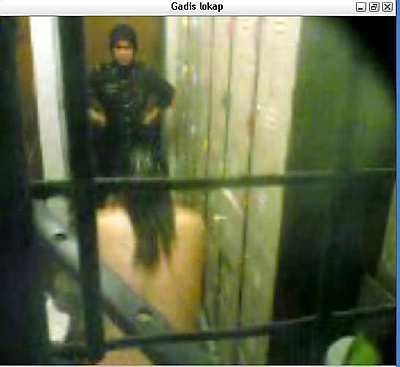 4th - New bird flu crisis reported in Asia following outbreaks in China and Vietnam.
4th - The Vatican endorses Darwinian evolution, citing the church's denunciation of Galileo as a "permanent lesson".
5th - The release of THES' World University Rankings sparks debate about the perceived decline of Malaysian public universities.
22nd - Xbox 360 is released in North America.
24th - Seputeh MP Teresa Kok highlights alleged police abuse of a woman in custody in Parliament, sparking a "Squatgate" scandal that raised human rights issues and possibly strained relations with China.
December
1st - First face transplant performed on French woman.
2nd - Convicted Australian drug trafficker Van Nguyen executed in Singapore despite repeated diplomatic appeals from Australian government.
4th - Nicol Ann David defeats Australian Rachael Grinham to become the new world number one in squash.
14th - George W. Bush takes responsibility for faulty intelligence in the Iraq War. He insists removing Saddam Hussein had still been necessary.
14th - Science journal Nature reports that the freely editable online encyclopedia Wikipedia is close to the traditional printed Britannica in the accuracy of its science entries.
15th - Iraq successfully holds its first parliamentary elections.
20th - A US federal judge rules that "intelligent design" should not be taught in Pennsylvania public schools alongside evolution theory, criticizing its proponents for disguising religion as science.
29th - Kofi Annan reports to the UN that armed attacks, rape, and pillage continue in Darfur, Sudan after three years despite international efforts to resolve the ethnic conflict.
Who knows what the next year holds for us?
4th - New bird flu crisis reported in Asia following outbreaks in China and Vietnam.
4th - The Vatican endorses Darwinian evolution, citing the church's denunciation of Galileo as a "permanent lesson".
5th - The release of THES' World University Rankings sparks debate about the perceived decline of Malaysian public universities.
22nd - Xbox 360 is released in North America.
24th - Seputeh MP Teresa Kok highlights alleged police abuse of a woman in custody in Parliament, sparking a "Squatgate" scandal that raised human rights issues and possibly strained relations with China.
December
1st - First face transplant performed on French woman.
2nd - Convicted Australian drug trafficker Van Nguyen executed in Singapore despite repeated diplomatic appeals from Australian government.
4th - Nicol Ann David defeats Australian Rachael Grinham to become the new world number one in squash.
14th - George W. Bush takes responsibility for faulty intelligence in the Iraq War. He insists removing Saddam Hussein had still been necessary.
14th - Science journal Nature reports that the freely editable online encyclopedia Wikipedia is close to the traditional printed Britannica in the accuracy of its science entries.
15th - Iraq successfully holds its first parliamentary elections.
20th - A US federal judge rules that "intelligent design" should not be taught in Pennsylvania public schools alongside evolution theory, criticizing its proponents for disguising religion as science.
29th - Kofi Annan reports to the UN that armed attacks, rape, and pillage continue in Darfur, Sudan after three years despite international efforts to resolve the ethnic conflict.
Who knows what the next year holds for us?
